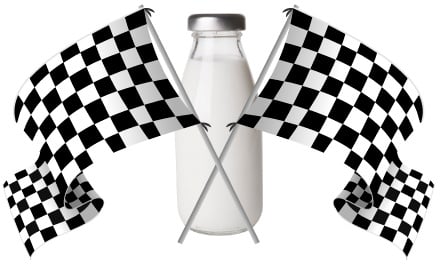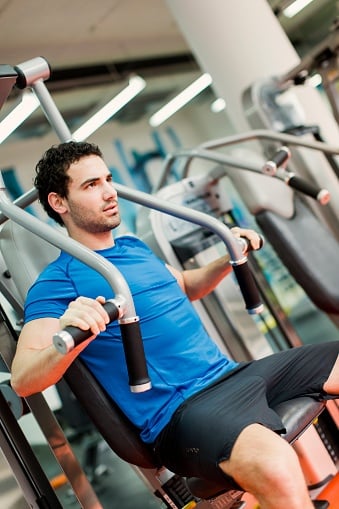Note: Please consult with your physician and/or a nutritionist before incorporating any major dietary changes or restrictions.
How Exercise Affects Your Body
 Your entire body is put under stress during a workout. Each body system fires in its own unique way in unison to keep pushing. Quite simply put, you might think of exercise as a controlled practice of breaking your body down to rebuild stronger.
Your entire body is put under stress during a workout. Each body system fires in its own unique way in unison to keep pushing. Quite simply put, you might think of exercise as a controlled practice of breaking your body down to rebuild stronger.
With each repetition, your muscle tissues are breaking down, releasing byproducts that stimulate your energy systems for sustained effort. We need this to keep moving, once we’ve used up our initial ATP Phosphocreatine and glycogen.
In recovery phases, these byproducts of lactate contribute to growth responses at the cellular level. Through the process of rebuilding, in recovery, our body utilizes nutrition, sleep, and hydration to “fortify” itself. It is amazing the adaptations the human body can make to a stimulus it is exposed to.
We also see with weight training or impact loading in aerobic exercises, that our bones have little cells called osteocytes that calcify and contribute to denser bone structures. All processes in your entire body are affected by physical activity, but the adaptations I mentioned are only optimal when we fuel our bodies correctly.
Why You Might Not Be Making “Gains”
Let me ask you this… How much do you eat every day? How much are you sleeping every night?
If you answered conservatively or with a low estimate of calories per day, that is your first issue. To gain muscle mass, or any mass, a surplus of daily calories is ideal. That isn’t eating the maintenance level of calories per day; that is eating above that range.
Prioritizing healthy and nutrient-dense food options may be an obvious thing for some. Assuming you do not have special dietary considerations, you might look at a macromodel of nutrition.
Understanding the Macromodel of Nutrition
The macromodel of nutrition is a generalized diet practice incorporating an emphasis on the content of major macromolecules in our foods. Carbs, Proteins, and Fats are the Macromolecules that our body utilizes.
Daily Caloric Split (Macromodel Example):
-
Carbohydrates: 45–65%
-
Proteins: 10–35%
-
Fats: 10–25%
Carbohydrates: Fuel Your Activities
Carbohydrates consist of an average of 45-65% of our total caloric intake per day. These molecules can be simple and complex. Simple carbs are found in sugar, bread, fruits, and quickly digested foods. Complex carbs consist of starches, vegetables, legumes, and fibrous options. Complex carbs take longer to digest, but keep the body fueled for sustained effort due to a generally higher caloric content.
The positive aspect of simple carbohydrates is that they offer quick energy with less time to digest and offer availability in our tissues for rapid use. The drawback of simple carbs is that they hike up our blood sugar, which puts a higher glycemic load on the body. In a healthy individual, that is fine and could offer recovery benefits if training (paired with protein), because they have a healthy insulin response to this sudden sugar spike. The sugar gets to our muscles and “where it needs to go” with insulin release from our liver. In an older individual or an individual with compromised energy systems, such as diabetes and metabolic conditions, it may be better to favor more complex carbs that slow digestion and the release of sugar due to the fiber content.
For the general person, the main consideration for training days would be windows of digestion and bioavailability. Typically, 2-3 hours would be a good timeframe before training to prioritize your simpler sugars. Beyond that, 3-5 hours before exercise would emphasize complex carbohydrates. For example, when you train legs at 4 pm, you might look at a 12 pm lunch with a fibrous salad and lean protein. At 3 pm, you may eat an apple for a quick pick-me-up before your squats. You allow that digestion time for fibrous foods in advance and rely on the quick, simple carbs before your higher activity level.
Fats (Lipids): Essential and Beneficial
Many people are misinformed by thinking that limiting fats in their diet is “healthy” is good, but this is a nuanced subject. Fats (Lipids) support our health more related to sustained low-intensity activities, cellular function, and hormonal responses. We need an essential level of fat stored on our bodies to allow for healthy bodily functions. Our body can convert excess energy into body fat from other macromolecules like carbs and proteins, when eating those in surplus as well.
Don’t shy away or eliminate fat in your diet, because it is necessary for your health and functioning. In a macromodel meal plan, you might prioritize 10-25% of your diet to involve a balance of saturated animal fats and unsaturated fats such as nuts, olive oil, avocados, and chia seeds.
Saturated fats can be moderately consumed by healthy individuals with well-regulated metabolism and regular physical activity. However, when eaten in excess amounts regularly in our diet, it may be connected to endothelial dysfunction and, in the long term, may contribute to atherosclerosis. This happens when the endothelial layer (inside walls of our blood vessels and capillaries are unable to release Nitric oxide as effectively to dilate. The reduced endothelial function leads to the formation of superoxide and oxidative stressors, which, over time, can lead to heart disease. Continued moderate to high intensity aerobic activity is one way to protect against the oxidative stress caused by excess fats in our diet.
One consideration before exercise would be to avoid high-fat content in your food choices before exercise, because it may negatively affect nitric oxide bioavailability when going into exercise.
Proteins: Your Body’s Building Blocks
Proteins are less involved in our daily energy levels during activities or at rest, and are more involved in the recovery processes across your entire body. As members of a gym, we think in terms of muscle tissue, but realistically, protein and amino profiles from our diet are involved in building all cells from our own DNA structures. We need proteins to utilize our “genetic scaffolding” and, from that, adapt and build new tissues after they break.
Maintaining a consistent protein intake of around 0.8-1.1g per kilogram per day is a minimal maintenance guideline. That need could be higher based on the individual, their regular physical activity, and other lifestyle factors.
One consideration after exercise would be to consume protein and carbohydrates within a 45-minute window after exercise. For strength training, that would look like a 3:1 ratio of grams of protein to carbohydrates. This would aid in replenishment of glycogen (“sugar” in our muscles) after exercise and may mitigate loss of muscle mass after exercise.
How NIFS Can Help
If you’d like to learn more about your caloric needs at rest or with activity, please contact our fitness center. We offer RMR (resting metabolic rate) testing, as well as Vo2 Max testing. Both assessments may help you dial your diet to reach your goals.

 Starting your fitness journey is always an exciting step forward, but it is essential to make sure you are listening to your body and prioritizing your recovery and self-care. Many people tend to neglect their bodies' needs and push themselves past their limits, which isn’t necessarily a bad thing. The importance of recovery and self-care play a crucial role in ensuring your long-term success in the gym, and one mistake can lead to a possible injury that can take away and/or limit that progress.
Starting your fitness journey is always an exciting step forward, but it is essential to make sure you are listening to your body and prioritizing your recovery and self-care. Many people tend to neglect their bodies' needs and push themselves past their limits, which isn’t necessarily a bad thing. The importance of recovery and self-care play a crucial role in ensuring your long-term success in the gym, and one mistake can lead to a possible injury that can take away and/or limit that progress.
 Over the past six to eights weeks, I have been creating summer workout manuals for the teams that I work with during the school year. These manuals are meant to bridge the strength and conditioning gap between the time they leave for summer break and when they return for the fall semester. There is much to be gained, or lost, through a summer of hard work (or lack thereof). Although summer break is a true “break” for most athletes academically, there never really is a true break for training.
Over the past six to eights weeks, I have been creating summer workout manuals for the teams that I work with during the school year. These manuals are meant to bridge the strength and conditioning gap between the time they leave for summer break and when they return for the fall semester. There is much to be gained, or lost, through a summer of hard work (or lack thereof). Although summer break is a true “break” for most athletes academically, there never really is a true break for training.
 With the Indianapolis 500
With the Indianapolis 500  Building muscle is perhaps the most common goal (second to fat loss) of an exercise program. Many people eventually hit a plateau with exercise routines and muscle-gaining processes and find it increasingly difficult to continue putting on new muscle. Once the body becomes too familiar with certain exercises or a certain style of training, your results will be hindered.
Building muscle is perhaps the most common goal (second to fat loss) of an exercise program. Many people eventually hit a plateau with exercise routines and muscle-gaining processes and find it increasingly difficult to continue putting on new muscle. Once the body becomes too familiar with certain exercises or a certain style of training, your results will be hindered.  We know it is encouraged by fitness professionals, and included at the end of group exercise classes, but I want to ask you, personally: how many times after a workout do you actually take the time to cool down?
We know it is encouraged by fitness professionals, and included at the end of group exercise classes, but I want to ask you, personally: how many times after a workout do you actually take the time to cool down?  There are so many things in life that can affect different aspects of the human body, and stress is one of the biggest! During a stressful time in life, the body can undergo several physiological changes that can be detrimental to your overall health. Though sometimes we cannot avoid certain stressors that fall into our path of life, there are some things that can be done to help you cope during those times.
There are so many things in life that can affect different aspects of the human body, and stress is one of the biggest! During a stressful time in life, the body can undergo several physiological changes that can be detrimental to your overall health. Though sometimes we cannot avoid certain stressors that fall into our path of life, there are some things that can be done to help you cope during those times.